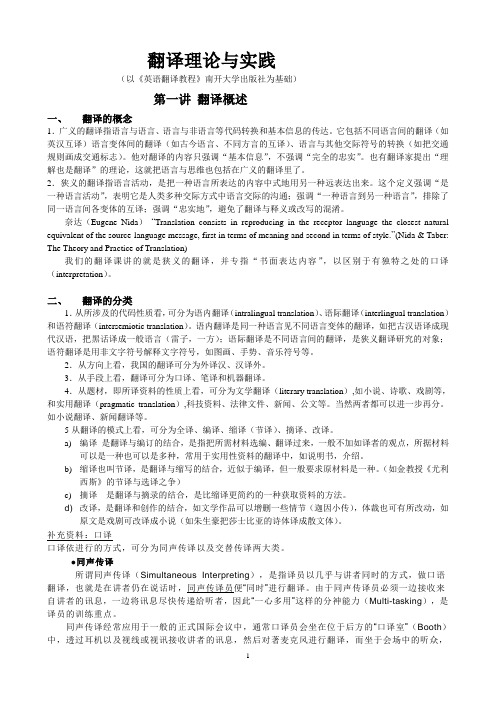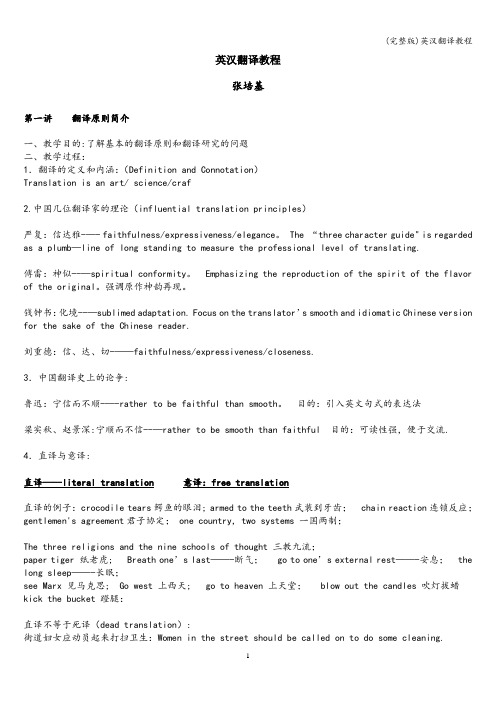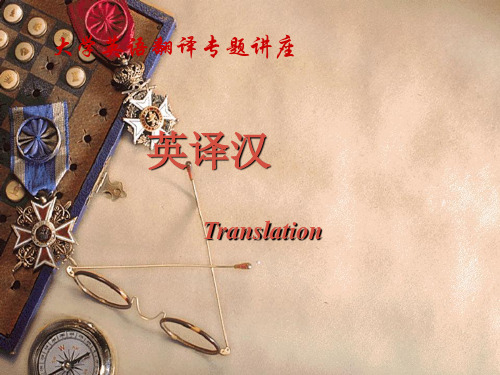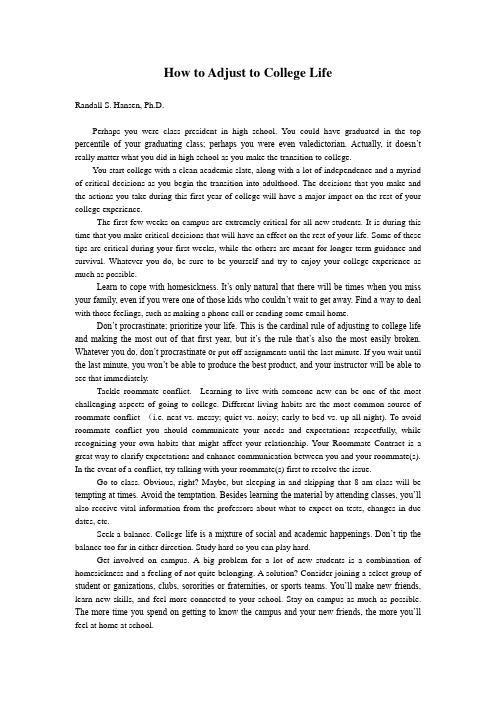大学英语翻译全教程第一讲(完美版)
- 格式:doc
- 大小:51.50 KB
- 文档页数:4


学习外语是我一生中最艰苦也是最有意义的经历之一。
虽然时常遭遇挫折,但却非常有价值。
我学外语的经历始于初中的第一堂英语课。
老师很慈祥耐心,时常表扬学生。
由于这种积极的教学方法,我踊跃回答各种问题,从不怕答错。
两年中,我的成绩一直名列前茅。
到了高中后,我渴望继续学习英语。
然而,高中时的经历与以前大不相同。
以前,老师对所有的学生都很耐心,而新老师则总是惩罚答错的学生。
每当有谁回答错了,她就会用长教鞭指着我们,上下挥舞大喊:“错!错!错!”没有多久,我便不再渴望回答问题了。
我不仅失去了回答问题的乐趣,而且根本就不想再用英语说半个字。
好在这种情况没持续多久。
到了大学,我了解到所有学生必须上英语课。
与高中老师不同,大学英语老师非常耐心和蔼,而且从来不带教鞭!不过情况却远不尽如人意。
由于班大,每堂课能轮到我回答的问题寥寥无几。
上了几周课后,我还发现许多同学的英语说得比我要好得多。
我开始产生一种畏惧感。
虽然原因与高中时不同,但我却又一次不敢开口了。
看来我的英语水平要永远停步不前了。
直到几年后我有机会参加远程英语课程,情况才有所改善。
这种课程的媒介是一台电脑、一条电话线和一个调制解调器。
我很快配齐了必要的设备并跟一个朋友学会了电脑操作技术,于是我每周用5到7天在网上的虚拟课堂里学习英语。
网上学习并不比普通的课堂学习容易。
它需要花许多的时间,需要学习者专心自律,以跟上课程进度。
我尽力达到课程的最低要求,并按时完成作业。
我随时随地都在学习。
不管去哪里,我都随身携带一本袖珍字典和笔记本,笔记本上记着我遇到的生词。
我学习中出过许多错,有时是令人尴尬的错误。
有时我会因挫折而哭泣,有时甚至想放弃。
但我从未因别的同学英语说得比我快而感到畏惧,因为在电脑屏幕上作出回答之前,我可以根据自己的需要花时间去琢磨自己的想法。
突然有一天我发现自己什么都懂了,更重要的是,我说起英语来灵活自如。
尽管我还是常常出错,还有很多东西要学,但我已尝到了刻苦学习的甜头。

翻译理论与实践(以《英语翻译教程》南开大学出版社为基础)第一讲翻译概述一、翻译的概念1.广义的翻译指语言与语言、语言与非语言等代码转换和基本信息的传达。
它包括不同语言间的翻译(如英汉互译)语言变体间的翻译(如古今语言、不同方言的互译)、语言与其他交际符号的转换(如把交通规则画成交通标志)。
他对翻译的内容只强调“基本信息”,不强调“完全的忠实”。
也有翻译家提出“理解也是翻译”的理论,这就把语言与思维也包括在广义的翻译里了。
2.狭义的翻译指语言活动,是把一种语言所表达的内容中式地用另一种远表达出来。
这个定义强调“是一种语言活动”,表明它是人类多种交际方式中语言交际的沟通;强调“一种语言到另一种语言”,排除了同一语言间各变体的互译;强调“忠实地”,避免了翻译与释义或改写的混淆。
奈达(Eugene Nida)“Translation consists in reproducing in the receptor language the closest natural equivalent of the source-language message, first in terms of meaning and second in terms of style.”(Nida & Taber: The Theory and Practice of Translation)我们的翻译课讲的就是狭义的翻译,并专指“书面表达内容”,以区别于有独特之处的口译(interpretation)。
二、翻译的分类1.从所涉及的代码性质看,可分为语内翻译(intralingual translation)、语际翻译(interlingual translation)和语符翻译(intersemiotic translation)。
语内翻译是同一种语言见不同语言变体的翻译,如把古汉语译成现代汉语,把黑话译成一般语言(雷子,一方);语际翻译是不同语言间的翻译,是狭义翻译研究的对象;语符翻译是用非文字符号解释文字符号,如图画、手势、音乐符号等。


Unit1 A篇学无止境 故事发生在一所东部大学里。
那是终考的最后一天。
一幢教学楼的台阶上围着一群大四的工科生,都在谈论即刻就要开始的考试。
他们脸上都带着自信。
这是毕业前的最后一场考试了,考完后,即是毕业典礼。
然后他们将各奔前程。
话题转到了工作上,有的谈起了找好的工作,有的则谈论着要找的工作。
4年的大学学习给了他们自信,使他们觉得自己足以征服世界。
眼前这场考试,不过是一碟小菜罢了。
老师已经说过可以携带所需的任何书本或笔记,只要不在考试时交头接耳就行了。
学生们兴高采烈地步入教室。
试卷发下来了。
看到只有5道论述题,他们一个个脸笑上开了花。
3小时过去后,老师开始收卷。
学生们先前的那份自信再也看不到了,而是满脸惊慌。
老师握着试卷,面对全班,大家都沉默不语。
她扫了一眼眼前这一张张不安的脸,问道:"5道题全答完的有多少?" 没人举手。
"做完4道的有多少?" 还是没人举手。
"3道呢?两道呢?" 学生们再也坐不住了。
"那么一道呢?总有做完一道的吧。
" 教室里依然鸦雀无声。
老师搁下试卷,说道:"这我早料到了。
" "我只是想让你们牢牢记住,即使你们已经完成了4年工科学习,这个领域你们还有很多东西要学。
其实,你们答不出的这些问题在日常生活中很常见。
"她笑了笑,接着说,"这门课你们都能通过,但要记住,你们虽然已经大学毕业,但学习才刚刚开始。
" 多年后,我已忘了这位老师的姓名,但牢牢记住了她的教诲。
B篇回眸大学 4年的时光已经过去,这一刻终于来临了。
不到两周,我就要毕业了。
此刻回想起来,我仍不敢相信时光飞逝如斯。
我依然记得第一天去上课时的情景,我一边望着课表背面的地图,一边打听教学楼在哪儿。
现在我已是大四的学生,常会以羡慕的眼光看着一年级的新生。
每天我都祈愿时间会凝滞,接下来的两周过得更慢一些。

英汉翻译教程张培基第一讲翻译原则简介一、教学目的:了解基本的翻译原则和翻译研究的问题二、教学过程:1.翻译的定义和内涵:(Definition and Connotation)Translation is an art/ science/craf2.中国几位翻译家的理论(influential translation principles)严复:信达雅-—- faithfulness/expressiveness/elegance。
The “three character guide" is regarded as a plumb—line of long standing to measure the professional level of translating.傅雷:神似--—spiritual conformity。
Emphasizing the reproduction of the spirit of the flavor of the original。
强调原作神韵再现。
钱钟书:化境--—sublimed adaptation. Focus on the translator’s smooth and idiomatic Chinese version for the sake of the Chinese reader.刘重德:信、达、切-——faithfulness/expressiveness/closeness.3.中国翻译史上的论争:鲁迅:宁信而不顺-—-rather to be faithful than smooth。
目的:引入英文句式的表达法梁实秋、赵景深:宁顺而不信--—rather to be smooth than faithful 目的:可读性强,便于交流.4.直译与意译:直译—--literal translation意译:free translation直译的例子:crocodile tears鳄鱼的眼泪; armed to the teeth武装到牙齿; chain reaction连锁反应;gentlemen's agreement君子协定; one country, two systems 一国两制;The three religions and the nine schools of thought 三教九流;paper tiger 纸老虎; Breath one’s last——-断气; go to one’s external rest——-安息; the long sleep——-长眠;see Marx 见马克思; Go west 上西天; go to heaven 上天堂; blow out the candles 吹灯拔蜡kick the bucket 蹬腿:直译不等于死译(dead translation):街道妇女应动员起来打扫卫生:Women in the street should be called on to do some cleaning.“In the street" should be replaced by “in the community”.她一大早起床,进城,见到了她的公爹:She got up early, went to the town and saw her public father。


大学英语教材1全文翻译Unit 1: Introduction to EnglishEnglish is an international language that is widely spoken and understood across the globe. It is important to study English as it serves as a means of communication with people from different cultures. In this unit, we will delve deeper into the basics of the English language.Chapter 1: The Sounds of English1.1 Vowels and ConsonantsEnglish consists of both vowels and consonants. Vowels are voiced sounds produced with an open vocal tract, while consonants involve some form of constriction or closure. The pronunciation of English words heavily relies on these sounds.1.2 Stress and IntonationStress refers to the emphasis placed on certain syllables or words within a sentence. This plays a crucial role in conveying meaning and expressing emotions. Intonation, on the other hand, is the rise and fall of the voice while speaking.Chapter 2: Grammar and Sentence Structure2.1 Parts of SpeechEnglish comprises various parts of speech, including nouns, verbs, adjectives, adverbs, pronouns, prepositions, and conjunctions.Understanding their roles in a sentence is essential for constructing grammatically correct sentences.2.2 Sentence TypesEnglish sentences can be categorized into four types: declarative, interrogative, imperative, and exclamatory. Each type conveys a different mood or purpose. Through exercises and activities, students will learn howto form and identify these sentence types.Chapter 3: Vocabulary and Word Usage3.1 Word FormationEnglish words can be formed through various processes such as affixation, conversion, compound formation, and blending. This chapter explores the different strategies for building vocabulary.3.2 Collocations and Idiomatic ExpressionsCollocations are combinations of words that are frequently used together, while idiomatic expressions are phrases with figurative meanings that cannot be inferred from individual words. Learning collocations and idioms enhances students' language proficiency and fluency.Unit 2: Reading and ComprehensionChapter 1: Reading StrategiesThis chapter introduces effective reading strategies such as skimming, scanning, and predicting. These skills enable students to extract important information quickly and comprehend texts more efficiently.Chapter 2: Context CluesContext clues are words or phrases surrounding an unfamiliar word that provide hints for its meaning. Understanding how to use context clues empowers students to infer the meaning of unknown words while reading.Chapter 3: Reading Comprehension SkillsDeveloping reading comprehension skills is essential for understanding texts at various levels of complexity. Students will learn techniques such as summarizing, synthesizing, and evaluating information.Unit 3: WritingChapter 1: The Writing ProcessWriting involves a series of steps, including prewriting, drafting, revising, editing, and publishing. This chapter guides students through each stage, providing tips on generating ideas, organizing content, and polishing their final drafts.Chapter 2: Paragraph StructureA well-structured paragraph consists of a clear topic sentence, supporting sentences, and a concluding sentence. This chapter teaches students how to construct coherent and cohesive paragraphs.Chapter 3: Essay WritingFrom persuasive essays to descriptive essays, this chapter covers various essay types and provides guidelines on writing effective introductions, body paragraphs, and conclusions. Students will also learn how to incorporate evidence and develop their arguments.以上是大学英语教材1的全文翻译,希望对您有所帮助。

第一课救赎 ----兰斯顿.休斯在我快13岁那年,我的灵魂得到了拯救,然而并不是真正意义上的救赎。
事情是这样的。
那时我的阿姨里德所在的教堂正在举行一场盛大的宗教复兴晚会。
数个星期以来每个夜晚,人们在那里讲道,唱诵,祈祷。
连一些罪孽深重的人都获得了耶稣的救赎,教堂的成员一下子增多了。
就在复兴晚会结束之前,他们为孩子们举行了一次特殊的集会——把小羊羔带回羊圈。
里德阿姨数日之前就开始和我提这件事。
那天晚上,我和其他还没有得到主宽恕的小忏悔者们被送去坐在教堂前排,那是为祷告的人安排的座椅。
我的阿姨告诉我说:“当你看到耶稣的时候,你看见一道光,然后感觉心里似乎有什么发生。
从此以后耶稣就进入了你的生命,他将与你同在。
你能够看见、听到、感受到他和你的灵魂融为一体。
”我相信里德阿姨说的,许多老人都这么说,似乎她们都应该知道。
尽管教堂里面拥挤而闷热,我依然静静地坐在那里,等待耶稣的到来。
布道师祷告,富有节奏,非常精彩。
呻吟、喊叫、寂寞的呼喊,还有地狱中令人恐怖的画面。
然后他唱了一首赞美诗。
诗中描述了99只羊都安逸的待在圈里,唯有一个被冷落在外的情形。
唱完后他说道:“难道你不来吗?不来到耶稣身旁吗?小羊羔们,难道你们不来吗?”他向坐在祷告席上的小忏悔者们打开了双臂,小女孩们开始哭了,她们中有一些很快跳了起来,跑了过去。
我们大多数仍然坐在那里。
许多长辈过来跪在我们的身边开始祷告。
老妇人的脸像煤炭一样黑,头上扎着辫子,老爷爷的手因长年的工作而粗糙皲裂。
他们吟唱着“点燃微弱的灯,让可怜的灵魂得到救赎”的诗歌。
整个教堂里到处都是祈祷者的歌声。
最后其他所有小忏悔者们都去了圣坛上,得到了救赎,除了一个男孩和依然静静地坐着等侯的我。
那个男孩是一个守夜人的儿子,名字叫威斯特里。
在我们的周围尽是祈祷的修女执事。
教堂里异常闷热,天色也越来越暗了。
最后威斯特里小声对我说:“去他妈的上帝。
我再也坐不住了,我们站起来吧,就可以得到救赎了。
”于是他就站了起来,也因此得到了救赎。

大学英语教材1课文翻译Unit 1: Introduction to EnglishLesson 1: GreetingsGreetings are the way we express goodwill when we meet or welcome someone. They are an important part of social interaction and can vary across cultures.In English-speaking countries, common greetings include "Good morning," "Good afternoon," and "Good evening." These greetings are often accompanied by a friendly smile and a firm handshake. Additionally, asking "How are you?" is a customary way to show interest in the other person's well-being.In formal situations, such as meetings or professional settings, greetings are more formal and may consist of a simple nod or a slight bow. It is important to maintain proper etiquette and show respect towards others.Understanding the appropriate greetings in different scenarios is crucial to effective communication. In English, it is considered polite to greet people when entering a room or starting a conversation. Failure to do so may be seen as impolite or rude.Furthermore, greetings may vary based on the time of day. For instance, "Good morning" is used before noon, while "Good afternoon" is suitable for the period between noon and sunset. "Good evening" is used after sunset and is typically used as a parting phrase.Learning greetings is one of the first steps in mastering a language. It not only helps you initiate conversations but also portrays your interest in others. By understanding and using appropriate greetings, you can create a positive impression and build rapport with people from different backgrounds.In conclusion, greetings play a significant role in social interactions and communication. They reflect cultural norms and contribute to establishing connections. Regardless of the language, greetings serve as a bridge between individuals, fostering mutual understanding and respect.。

大学英语读写教程1课文翻译Unit 1Lesson 1: The EarthThe Earth is our home. It is the third planet from the sun in our solar system. It is the only planet known to have life. The Earth is a beautiful and diverse place, with vast oceans, towering mountains, and lush forests.The Earth is approximately 4.6 billion years old. It has a diameter of about 12,742 kilometers and a circumference of around 40,075 kilometers. It is made up of several layers, including the crust, mantle, and core.The Earth rotates on its axis, which takes approximately 24 hours to complete one full rotation. This rotation gives us day and night. The Earth also orbits around the sun, completing one orbit in about 365.25 days, giving us the concept of a year.The Earth is made up of many different ecosystems. These ecosystems support a wide variety of plants, animals, and microorganisms. It is important to protect and preserve these ecosystems to maintain the delicate balance of life on Earth.The Earth's climate is constantly changing. It experiences seasons due to the tilt of its axis. It also undergoes long-term changes, such as global warming, which is primarily caused by human activities. As inhabitants of this planet, we have a responsibility to take care of the Earth. We should reduce our carbon footprint, recycle,conserve water, and protect the natural environment. By doing so, we can ensure a sustainable future for ourselves and future generations.。

Unit 1 Personal Relationships1-1 The gift of life【1】炸弹落在了这个小村庄里。
在可怕的越南战争期间,谁也不知道这些炸弹要轰炸什么目标,而它们却落在了一所由传教士们办的小孤儿院内。
【2】传教士和一、两个孩子已经丧生,还有几个孩子受了伤,其中有一个小女孩,8岁左右,她的双腿被炸伤。
【3】几小时后,医疗救援小组到了。
救援小组由一名年轻的美国海军医生和一名同样年轻的海军护士组成。
他们很快发现有个小女孩伤势严重。
如果不立即采取行动,显然她将因失血过多和休克而死亡。
【4】他们明白必须给小女孩输血,但是他们的医药用品很有限,没有血浆,因此需要一种相配的血型。
快速的血型测定显示两名美国人的血型都不合适。
几个没有受伤的孤儿却有相配的血型。
【5】这位医生会讲一点越南语,护士会讲一点法语,但只有中学的法语水平。
孩子们不会说英语,只会说一点法语。
医生和护士用少得可怜的一点共同语言,结合大量的手势语,努力向这些受惊吓的孩子们解释说,除非他们能输一些血给自己的小伙伴,否则她将必死无疑。
接着问他们是否有人愿意献血来救小女孩。
【6】对医生和护士的请求,孩子们(只是)瞪大眼睛,一声不吭。
此时小病人生命垂危。
然而,只有这些受惊吓的孩子中有人自愿献血,他们才能够得到血。
过了好一会儿,一只小手慢慢地举了起来,然后垂了下去,一会儿又举了起来。
【7】"噢,谢谢。
" 护士用法语说。
"你叫什么名字?"【8】"兴," 回答道。
【9】兴很快被抱到一张床上,手臂用酒精消毒后,针就扎了进去。
在整个过程中,兴僵直地躺着,没有出声。
【10】过了一会儿,他发出了一声长长的抽泣,但立即用那只可以活动的手捂住了自己的脸。
【11】"兴,疼吗?" 医生问。
【12】兴默默地摇了摇头,但一会儿忍不住又抽泣起来,并又一次试图掩饰自己的哭声。
医生又问是否是插在手臂上的针弄疼了他,兴又摇了摇头。

从孩提时代,我还住在贝尔维尔时,我的脑子里就断断续续地转着当作家的念头,但直等到我高中三年级,这一想法才有了实现的可能。
在这之前,我对所有跟英文课沾边的事都感到腻味。
我觉得英文语法枯燥难懂。
我痛恨那些长而乏味的段落写作,老师读着受累,我写着痛苦。
弗利格尔先生接我们的高三英文课时,我就准备着在这门最最单调乏味的课上再熬上沉闷的一年。
弗利格尔先生在学生中以其说话干巴和激励学生无术而出名。
据说他拘谨刻板,完全落后于时代。
我看他有六七十岁了,古板之极。
他戴着古板的毫无装饰的眼镜,微微卷曲的头发剪得笔齐,梳得纹丝不乱。
他身穿古板的套装,白衬衣领扣外的领带打得一丝不苟。
他长着古板的尖下巴,古板的直鼻梁,说起话来一本正经,字斟句酌,彬彬有礼,活脱脱一个滑稽的老古董。
我做好准备,打算在弗利格尔先生的班上一无所获地混上一年,不少日子过去了,还真不出所料。
后半学期我们学写随笔小品文。
弗利格尔先生发下一张家庭作业纸,出了不少题目供我们选择。
像“暑假二三事”那样傻乎乎的题目倒是一个也没有,但绝大多数一样乏味。
我把作文题带回家,一直没写,直到要交作业的前一天晚上,我躺在沙发上,最终不得不面对这一讨厌的功课,便从笔记本里抽出作文题目单粗粗看了一下。
我的目光落在“吃意大利细面条的艺术”这个题目上。
这个题目在我脑海里换起了一连串不同寻常的图像。
贝尔维尔之夜的清晰回忆如潮水一般涌来,当时,我们大家一起围坐在晚餐桌旁——艾伦舅舅、我母亲、查理舅舅、多丽丝、哈尔舅舅——帕特舅妈晚饭做的是意大利细面条。
那时意大利细面条还是很少听说的异国食品。
多丽丝和我都还从来没吃过,在座的大人也是经验不足,没有一个吃起来得心应手的。
艾伦舅舅家诙谐有趣的场景全都重现在我的脑海中,我回想起来,当晚我们笑作一团,争论着该如何地把面条从盘子上送到嘴里才算合乎礼仪。
突然我就想描述那一切,描述当时那种温馨美好的气氛,但我把它写下来仅仅是想自得其乐,而不是为弗利格尔先生而写。

新视野大学英语(第三版)读写教程第一册课文翻译(全册)奔向更加光明的未来1下午好!作为校长,我非常自豪地欢迎你们来到这所大学。
你们所取得的成就是你们自己多年努力的结果,也是你们的父母和老师们多年努力的结果。
在这所大学里,我们承诺将使你们学有所成。
2在欢迎你们到来的这一刻,我想起自己高中毕业时的情景,还有妈妈为我和爸爸拍的合影。
妈妈吩咐我们:“姿势自然点。
” “等一等,”爸爸说,“把我递给他闹钟的情景拍下来。
” 在大学期间,那个闹钟每天早晨叫醒我。
至今它还放在我办公室的桌子上。
3让我来告诉你们一些你们未必预料得到的事情。
你们将会怀念以前的生活惯,怀念父母曾经提醒你们要刻苦研究、取得佳绩。
你们可能因为高中生活终于结束而喜极而泣,你们的父母也可能因为终于不用再给你们洗衣服而喜极而泣!但是要记住:未来是建立在过去扎实的基础上的。
4对你们而言,接下来的四年将会是无与伦比的一段时光。
在这里,你们拥有丰富的资源:有来自全国各地的有趣的学生,有学识渊博又充满爱心的老师,有综合性图书馆,有完备的运动设施,还有针对不同兴趣的学生社团——从文科社团到理科社团、到社区服务等等。
你们将自由地探索、研究新科目。
你们要学着惯点灯熬油,学着结交充满魅力的人,学着去追求新的爱好。
我想鼓励你们充分利用这一特殊的经历,并用你们的干劲和热情去收获这一机会所带来的丰硕成果。
5有这么多课程可供选择,你可能会不知所措。
你不可能选修所有的课程,可是要尽可能体验更多的课程!大学里有良多事情可做可学,每件事情都会为你供给不同视角来审视世界。
如果我只能给你们一条选课建议的话,那就是:挑战自己!不要以为你早就了解自己对什么样的领域最感兴趣。
选择一些你从未接触过的领域的课程。
这样,你不仅会变得更加博学,而且更有可能发现一个你未曾想到的、能成就你未来的爱好。
一个绝佳的例子就是时装设计师XXX,她最初学的是艺术史。
跟着工夫的推移,XXX把艺术史研究和对时装的热爱结合起来,并将其转化为对设计的热情,从而使她成为全球著名的设计师。


大学英语1英语课文翻译IntroductionIn this article, we will provide a translation of an English text that is frequently used as a lesson in a college-level English course. The translation aims to accurately convey the meaning of the original text while maintaining readability and coherence.Text Translation原文:The Value of a College EducationA widely debated topic today is whether college education is worth the investment. The rising cost of tuition fees and the increasing number of graduates struggling to find employment have fueled this ongoing discussion. However, despite the challenges, obtaining a college education is still highly valuable for several reasons.First and foremost, a college education provides individuals with expanded knowledge and specialized skills. Through a variety of courses and programs, students develop critical thinking abilities, analytical skills, and a broader understanding of the world. This comprehensive education equips graduates with the tools to navigate and succeed in a competitive job market.In addition, a college degree opens doors to better career opportunities and higher earning potential. Statistics consistently show that those with a college education earn higher salaries compared to those without. Thespecialized knowledge gained through higher education allows individuals to qualify for higher-paying positions and positions in fields that require specific expertise. Furthermore, graduates are more likely to receive benefits such as healthcare and retirement plans, which contribute to their overall financial stability.Moreover, college provides a unique environment for personal growth and development. The college experience exposes students to a diverse range of ideas, cultures, and perspectives. This exposure fosters tolerance, empathy, and open-mindedness - skills that are essential in a globalized society. Additionally, students have the opportunity to engage in extracurricular activities, develop leadership skills, and build a strong network of contacts, which can greatly benefit them in their future endeavors.Lastly, a college education has long-term societal benefits. College graduates tend to be more informed and engaged citizens, actively contributing to their communities. They are more likely to vote, participate in volunteer work, and promote positive change. Moreover, higher education institutions often serve as hubs for research and innovation, leading to advancements in various fields and driving societal progress.In conclusion, while the debate over the value of a college education continues, it is evident that obtaining a college degree remains highly advantageous. The expanded knowledge, specialized skills, improved career prospects, personal growth, and long-term societal benefits make investing in higher education a worthwhile endeavor.翻译:大学教育的价值今天一个被广泛争论的话题是大学教育是否值得投资。



How to Adjust to College LifeRandall S. Hansen, Ph.D.Perhaps you were class president in high school. You could have graduated in the top percentile of your graduating class; perhaps you were even valedictorian. Actually, it doesn‟t really matter what you did in high school as you make the transition to college.You start college with a clean academic slate, along with a lot of independence and a myriad of critical decisions as you begin the transition into adulthood. The decisions that you make and the actions you take during this first year of college will have a major impact on the rest of your college experience.The first few weeks on campus are extremely critical for all new students. It is during this time that you make critical decisions that will have an effect on the rest of your life. Some of these tips are critical during your first weeks, while the others are meant for longer-term guidance and survival. Whatever you do, be sure to be yourself and try to enjoy your college experience as much as possible.Learn to cope with homesickness. It‟s only natural that there will be times when you miss your family, even if you were one of those kids who couldn‟t wait to get away. Find a way to deal with those feelings, such as making a phone call or sending some email home.Don‟t procrastinate; prioritize your life. This is the cardinal rule of adjusting to college life and making the most out of that first year, but it‟s the rule that‟s also the most easily broken. Whatever you do, don‟t procrastinate o r put off assignments until the last minute. If you wait until the last minute, you won‟t be able to produce the best product, and your instructor will be able to see that immediately.Tackle roommate conflict. Learning to live with someone new can be one of the most challenging aspects of going to college. Different living habits are the most common source of roommate conflict (i.e. neat vs. messy; quiet vs. noisy; early-to-bed vs. up-all-night). To avoid roommate conflict you should communicate your needs and expectations respectfully, while recognizing your own habits that might affect your relationship. Your Roommate Contract is a great way to clarify expectations and enhance communication between you and your roommate(s). In the event of a conflict, try talking with your roommate(s) first to resolve the issue.Go to class. Obvious, right? Maybe, but sleeping in and skipping that 8 am class will be tempting at times. Avoid the temptation. Besides learning the material by attending classes, you‟ll also receive vital information from the professors about what to expect on tests, changes in due dates, etc.Seek a balance. College life is a mixture of social and academic happenings. Don‟t tip the balance too far in either direction. Study hard so you can play hard.Get involved on campus. A big problem for a lot of new students is a combination of homesickness and a feeling of not quite belonging. A solution? Consider joining a select group of student or ganizations, clubs, sororities or fraternities, or sports teams. You‟ll make new friends, learn new skills, and feel more connected to your school. Stay on campus as much as possible. The more time you spend on getting to know the campus and your new friends, the more you‟ll feel at home at school.Strive for good grades. Remember the words of the opening paragraph; while good grades could have come naturally to you in high school, you will have to earn them in college—and that means setting some goals for yourself and then making sure you work as hard as you can to achieve them.Take advantage of the study resources on campus. Just about all colleges have learning labs and tutors ava ilable. If you‟re having some troubles, these resources are another tool available to you. Another idea: form study groups.Make time for you. Be sure you set aside some time and activities that help you relax. Whether it‟s watching your favorite movies o r writing in a journal, be good to yourself.Don‟t feel pressured to make a hasty decision about a career or a major. It doesn‟t matter if it seems as though everyone else seems to know what they‟re doing with their lives—believe me, they don‟t—college is the time for you to really discover who you are and what you want to be. It‟s not a race; take your time and enjoy exploring your options.Take responsibility for yourself and your actions. Don‟t look to place the blame on others for your mistakes; own up to them and move on. Being an adult means taking responsibility for everything that happens to you.Make connections with students in your classes. One of my best students said his technique in the first week of classes was to meet at least one new person in each of his classes. It expanded his network of friends—and was a crucial resource at times when he had to miss a class.Find the Career Services Office. Regardless of whether you have your entire future mapped out, seek out the wonderful professionals in your college‟s career services office and get started on planning, preparing, and acting on your future.Keep track of your money. If you‟ve never had to create a budget, now is the time to do so. Find ways to stretch your money and avoid all those cre dit card temptations you‟ll soon be receiving.Don‟t cut corners. College is all about learning. If you procrastinate and cram, you may still do well on tests, but you‟ll learn very little. Even worse, don‟t cheat on term papers or tests. When you follow these suggestions you will certainly adapt to college life quickly, easily and without needing a lot of time to settle in. You will be off and running and should consider theses tips as your success guide for settling into college.译文如何适应大学生活或许你在高中时是班长,或许你的毕业成绩名列前茅,甚至有可能你还是致告别词的学生代表。

翻译理论与实践(以《英语翻译教程》南开大学出版社为基础)第一讲翻译概述一、翻译的概念1.广义的翻译指语言与语言、语言与非语言等代码转换和基本信息的传达。
它包括不同语言间的翻译(如英汉互译)语言变体间的翻译(如古今语言、不同方言的互译)、语言与其他交际符号的转换(如把交通规则画成交通标志)。
他对翻译的内容只强调“基本信息”,不强调“完全的忠实”。
也有翻译家提出“理解也是翻译”的理论,这就把语言与思维也包括在广义的翻译里了。
2.狭义的翻译指语言活动,是把一种语言所表达的内容中式地用另一种远表达出来。
这个定义强调“是一种语言活动”,表明它是人类多种交际方式中语言交际的沟通;强调“一种语言到另一种语言”,排除了同一语言间各变体的互译;强调“忠实地”,避免了翻译与释义或改写的混淆。
奈达(Eugene Nida)“Translation consists in reproducing in the receptor language the closest natural equivalent of the source-language message, first in terms of meaning and second in terms of style.”(Nida & Taber: The Theory and Practice of Translation)我们的翻译课讲的就是狭义的翻译,并专指“书面表达内容”,以区别于有独特之处的口译(interpretation)。
二、翻译的分类1.从所涉及的代码性质看,可分为语内翻译(intralingual translation)、语际翻译(interlingual translation)和语符翻译(intersemiotic translation)。
语内翻译是同一种语言见不同语言变体的翻译,如把古汉语译成现代汉语,把黑话译成一般语言(雷子,一方);语际翻译是不同语言间的翻译,是狭义翻译研究的对象;语符翻译是用非文字符号解释文字符号,如图画、手势、音乐符号等。
2.从方向上看,我国的翻译可分为外译汉、汉译外。
3.从手段上看,翻译可分为口译、笔译和机器翻译。
4.从题材,即所译资料的性质上看,可分为文学翻译(literary translation),如小说、诗歌、戏剧等,和实用翻译(pragmatic translation),科技资料、法律文件、新闻、公文等。
当然两者都可以进一步再分。
如小说翻译、新闻翻译等。
5从翻译的模式上看,可分为全译、编译、缩译(节译)、摘译、改译。
a)编译是翻译与编订的结合,是指把所需材料选编、翻译过来,一般不加如译者的观点,所据材料可以是一种也可以是多种,常用于实用性资料的翻译中,如说明书,介绍。
b)缩译也叫节译,是翻译与缩写的结合,近似于编译,但一般要求原材料是一种。
(如金教授《尤利西斯》的节译与选译之争)c)摘译是翻译与摘录的结合,是比缩译更简约的一种获取资料的方法。
d) 改译,是翻译和创作的结合,如文学作品可以增删一些情节(迦因小传),体裁也可有所改动,如原文是戏剧可改译成小说(如朱生豪把莎士比亚的诗体译成散文体)。
补充资料:口译口译依进行的方式,可分为同声传译以及交替传译两大类。
●同声传译所谓同声传译(Simultaneous Interpreting),是指译员以几乎与讲者同时的方式,做口语翻译,也就是在讲者仍在说话时,同声传译员便“同时”进行翻译。
由于同声传译员必须一边接收来自讲者的讯息,一边将讯息尽快传递给听者,因此“一心多用”这样的分神能力(Multi-tasking),是译员的训练重点。
同声传译经常应用于一般的正式国际会议中,通常口译员会坐在位于后方的“口译室”(Booth)中,透过耳机以及视线或视讯接收讲者的讯息,然后对著麦克风进行翻译,而坐于会场中的听众,则可透过特殊的音讯接收设备,以耳机听取口译员的翻译。
正式的国际会议中,出于口译员精神负荷的考量,通常一种语言会由两位口译员负责,两人轮流进行翻译。
●交替传译所谓交替传译(Consecutive Interpreting),是指讲者讲到一个段落后,停下来让口译员进行翻译,以此方式交替进行。
由于讲者说话的时间长短不一,为了不遗漏重点,在短时间内以笔记的方式摘要讲者说过的内容,是同声传译员的训练重点之一。
关于口译的考试“翻译专业资格(水平)考试”(China Accreditation Test for Translators andInterpreters —CATTI )是在全国实行统一的、面向社会的、国内最具权威的翻译专业资格(水平)认证;是对参试人员口译或笔译方面的双语互译能力和水平的认定。
翻译专业资格(水平)考试合格,颁发由国家人力资源和社会保障部统一印制并用印的《中华人民共和国翻译专业资格(水平)证书》。
翻译专业资格(水平)考试在国家人力资源和社会保障部指导下,由中国外文局组织实施与管理。
2003年12月6日至7日,全国首次二级、三级英语口译、笔译试点考试在北京、上海、广州三个城市举行。
这项考试分三级、二级、一级口笔译翻译和资深翻译4个等级,目前我们进行的是二级口译、笔译翻译和三级口译、笔译翻译的考试。
2010年二级英语笔译、口译交替传译类考试和三级英语笔译、口译考试分为5月8、9日和11月13、14日两次举行;其他语种各级别考试均为一次。
三、译者的素养1.坚实的语言功底:不仅指外语,也指汉语水平,应有很强的双语能力。
提高的途径是多阅读,优秀的经典的中外文学作品。
例:There’s no pot so ugly it can’t find a lid.(该句的含义是“姑娘无论多丑也能配个汉子。
”)如果译为“没有丑到配不上一个盖子的罐子”,读起来未免平板滞重;如果译为“罐儿再丑,配个盖子不发愁”,意韵合拍,顿成妙笔佳句。
2.合理的知识结构:即杂学,天文地理、人情风俗、历史事件。
提高的途径是勤学多问,要成为一名杂家。
如:radio astronomer是“射电天文学家”不是“无线电天文学家”,radio telescope是“射电望远镜”不是“无线电望远镜”。
Radio noise 是“射频噪声”。
例:After lunching in the basement of the Medical School, Philip went back to his rooms. It was Saturday afternoon, and the landlady was cleaning the stairs.(在医学院地下室吃过午饭后,菲利普回到自己的寓所。
那是一个星期六的下午,女房东正在打扫楼梯。
)在英国把房屋分间出租供人住宿,被称为landlord/landlady。
有人缺乏相关背景知识,把landlady译为“女地主”。
3.学习一些翻译理论和技巧:如翻译的标准、过程方法、历史,翻译时所采用的各种方法。
4.高度的责任感:高度的责任感,不负责任的错误清则闹笑话,重则出事故。
如96年奥运会的三剑客就因为翻译的失误而错失金牌。
在1996年的亚特兰大奥运会上,因为翻译错了比赛时间,中国男子击剑队三剑客叶冲,王海滨,董兆致没有准时参加男子花剑的团体比赛,那时候中国三剑客正值上升期,绝对具备夺牌或者拿到金牌的实力,但就是因为翻译的疏忽让他们的奥运梦想破裂了。
四、翻译的步骤:1.理解(翻译的第一步);2 .表达(翻译);3检查(Proofreading)。
英译汉难在理解,因而造成误译。
如:“He only passed the French test.”(他勉强通过了法语考试)。
而不是“只有他通过了法语考试”(Only he passed the French test),也不是“他只通过了法语考试”(He passed only the French test)又如:上世纪三十年代,鲁迅与瞿秋白是主张用“直译法”翻译英语作品的,主张“宁信而不顺”,当时与“意译派”赵景深之流有较大冲突。
英语中的“milky way”的中文意思是“银河”,赵景深主张翻译外文“与其信而不顺,不如顺而不信“,竟然将其译成“牛奶路”。
这让鲁迅等人嗤之以鼻,鲁迅还稍弄文笔,作小诗一首以讽之。
诗云:“可叹织女星,竟作马郎妇。
喜鹊疑不来,条条牛奶路。
”(意思是:织女星被“牛头不对马嘴”之人配作了“马郎妇”,喜鹊看见不是牛郎,都不来了,如何相见呢?只有靠一条条的牛奶路了。
鲁迅将银河与牛郎织女之故事联系起来,又结合对手张冠李戴之作法,巧妙刺其不伦不类之意,令“意译派”尴尬不已,很下不来台。
)The Milky Way,传说中赫拉(古希腊神话中的天后,宙斯的姐姐和第三位妻子,她在奥林匹斯山的地位仅次于她的丈夫宙斯。
)的乳汁溅成的天路。
虽然赵景深“牛奶路”这个翻译曾受人耻笑并弃之不用,但“银河”一词未免又忽略了它背后的希腊神话故事,汉译英难在表达,如汉译英实践中的“三角钱”译成了“triangle money”。
五、大学生如何学好翻译(1)树立正确的学习态度,克服轻视、惧怕翻译的心理。
(2)掌握基本的翻译理论技巧知识(3)进行大量的实践:熟能生巧,在实践中不断摸索,提高认识,增强双语能力。
六、课堂练习1. 理解易,表达难(1)It was a cold winter day.这是一个寒冷的冬天。
(错)这是寒冬的一天。
(错)这是冬天的寒冷的一天。
(两个“的”,两个“天”,别扭)冬天一个寒冷的日子。
(2)She liked to be with him better than with others.她觉得跟他在一起比跟别人在一起开心。
(没错,但不顺)她觉得跟他在一起比跟谁都开心。
(更顺一些)她觉得跟他在一起最开心(好,汉语往往用最高级形式代替一般比较级形式)(3)离开教室的时候关灯。
Turn off the lights before you leave.(用when不符合英语习惯)2.理解难,(1)All me n can’t be first. 并非人人都可以拿第一。
(2)He has a large family. 他的子女很多。
(family在《牛津袖珍英汉双解词典》中的解释有a. numbers of a household 家庭成员;b. person’s children 子女)(3)I always get angry with him, I just can’t help it. 我老是对他发火,我就是控制不了我自己。
3.变性(词性发生变化)1)O. Henry is the creator of a new short story genre in literature.欧·亨利是文学上短篇小说的一种新体裁的创造者。